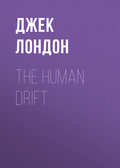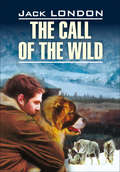
Джек Лондон
Lost Face
“Now mind you, not one of us knew that Dave Walsh was dead. We thought he was on the Glendale, bound for Dawson. The missionary had edged off to one side, and so Flush of Gold faced the box when it struck. It was like in a play. It couldn’t have been better planned. It struck on end, and on the right end; the whole front of the box came off; and out swept Dave Walsh on his feet, partly wrapped in a blanket, his yellow hair flying and showing bright in the sun. Right out of the box, on his feet, he swept upon Flush of Gold. She didn’t know he was dead, but it was unmistakable, after hanging up two days on a timber jam, that he was rising all right from the dead to claim her. Possibly that is what she thought. At any rate, the sight froze her. She couldn’t move. She just sort of wilted and watched Dave Walsh coming for her! And he got her. It looked almost as though he threw his arms around her, but whether or not this happened, down to the deck they went together. We had to drag Dave Walsh’s body clear before we could get hold of her. She was in a faint, but it would have been just as well if she had never come out of that faint; for when she did, she fell to screaming the way insane people do. She kept it up for hours, till she was exhausted. Oh, yes, she recovered. You saw her last night, and know how much recovered she is. She is not violent, it is true, but she lives in darkness. She believes that she is waiting for Dave Walsh, and so she waits in the cabin he built for her. She is no longer fickle. It is nine years now that she has been faithful to Dave Walsh, and the outlook is that she’ll be faithful to him to the end.”
Lon McFane pulled down the top of the blankets and prepared to crawl in.
“We have her grub hauled to her each year,” he added, “and in general keep an eye on her. Last night was the first time she ever recognized me, though.”
“Who are the we?” I asked.
“Oh,” was the answer, “the Count and old Victor Chauvet and me. Do you know, I think the Count is the one to be really sorry for. Dave Walsh never did know that she was false to him. And she does not suffer. Her darkness is merciful to her.”
I lay silently under the blankets for the space of a minute.
“Is the Count still in the country?” I asked.
But there was a gentle sound of heavy breathing, and I knew Lon McFane was asleep.
THE PASSING OF MARCUS O’BRIEN
“It is the judgment of this court that you vamose the camp.. in the customary way, sir, in the customary way.”
Judge Marcus O’Brien was absent-minded, and Mucluc Charley nudged him in the ribs. Marcus O’Brien cleared his throat and went on —
“Weighing the gravity of the offence, sir, and the extenuating circumstances, it is the opinion of this court, and its verdict, that you be outfitted with three days’ grub. That will do, I think.”
Arizona Jack cast a bleak glance out over the Yukon. It was a swollen, chocolate flood, running a mile wide and nobody knew how deep. The earth-bank on which he stood was ordinarily a dozen feet above the water, but the river was now growling at the top of the bank, devouring, instant by instant, tiny portions of the top-standing soil. These portions went into the gaping mouths of the endless army of brown swirls and vanished away. Several inches more, and Red Cow would be flooded.
“It won’t do,” Arizona Jack said bitterly. “Three days’ grub ain’t enough.”
“There was Manchester,” Marcus O’Brien replied gravely. “He didn’t get any grub.”
“And they found his remains grounded on the Lower River an’ half eaten by huskies,” was Arizona Jack’s retort. “And his killin’ was without provocation. Joe Deeves never did nothin’, never warbled once, an’ jes’ because his stomach was out of order, Manchester ups an’ plugs him. You ain’t givin’ me a square deal, O’Brien, I tell you that straight. Give me a week’s grub, and I play even to win out. Three days’ grub, an’ I cash in.”
“What for did you kill Ferguson?” O’Brien demanded. “I haven’t any patience for these unprovoked killings. And they’ve got to stop. Red Cow’s none so populous. It’s a good camp, and there never used to be any killings. Now they’re epidemic. I’m sorry for you, Jack, but you’ve got to be made an example of. Ferguson didn’t provoke enough for a killing.”
“Provoke!” Arizona Jack snorted. “I tell you, O’Brien, you don’t savve. You ain’t got no artistic sensibilities. What for did I kill Ferguson? What for did Ferguson sing ‘Then I wisht I was a little bird’? That’s what I want to know. Answer me that. What for did he sing ‘little bird, little bird’? One little bird was enough. I could a-stood one little bird. But no, he must sing two little birds. I gave ’m a chanst. I went to him almighty polite and requested him kindly to discard one little bird. I pleaded with him. There was witnesses that testified to that.
“An’ Ferguson was no jay-throated songster,” some one spoke up from the crowd.
O’Brien betrayed indecision.
“Ain’t a man got a right to his artistic feelin’s?” Arizona Jack demanded. “I gave Ferguson warnin’. It was violatin’ my own nature to go on listening to his little birds. Why, there’s music sharps that fine-strung an’ keyed-up they’d kill for heaps less’n I did. I’m willin’ to pay for havin’ artistic feelin’s. I can take my medicine an’ lick the spoon, but three days’ grub is drawin’ it a shade fine, that’s all, an’ I hereby register my kick. Go on with the funeral.”
O’Brien was still wavering. He glanced inquiringly at Mucluc Charley.
“I should say, Judge, that three days’ grub was a mite severe,” the latter suggested; “but you’re runnin’ the show. When we elected you judge of this here trial court, we agreed to abide by your decisions, an’ we’ve done it, too, b’gosh, an’ we’re goin’ to keep on doin’ it.”
“Mebbe I’ve been a trifle harsh, Jack,” O’Brien said apologetically – “I’m that worked up over those killings; an’ I’m willing to make it a week’s grub.” He cleared his throat magisterially and looked briskly about him. “And now we might as well get along and finish up the business. The boat’s ready. You go and get the grub, Leclaire. We’ll settle for it afterward.”
Arizona Jack looked grateful, and, muttering something about “damned little birds,” stepped aboard the open boat that rubbed restlessly against the bank. It was a large skiff, built of rough pine planks that had been sawed by hand from the standing timber of Lake Linderman, a few hundred miles above, at the foot of Chilcoot. In the boat were a pair of oars and Arizona Jack’s blankets. Leclaire brought the grub, tied up in a flour-sack, and put it on board. As he did so, he whispered – “I gave you good measure, Jack. You done it with provocation.”
“Cast her off!” Arizona Jack cried.
Somebody untied the painter and threw it in. The current gripped the boat and whirled it away. The murderer did not bother with the oars, contenting himself with sitting in the stern-sheets and rolling a cigarette. Completing it, he struck a match and lighted up. Those that watched on the bank could see the tiny puffs of smoke. They remained on the bank till the boat swung out of sight around the bend half a mile below. Justice had been done.
The denizens of Red Cow imposed the law and executed sentences without the delays that mark the softness of civilization. There was no law on the Yukon save what they made for themselves. They were compelled to make it for themselves. It was in an early day that Red Cow flourished on the Yukon – 1887 – and the Klondike and its populous stampedes lay in the unguessed future. The men of Red Cow did not even know whether their camp was situated in Alaska or in the North-west Territory, whether they drew breath under the stars and stripes or under the British flag. No surveyor had ever happened along to give them their latitude and longitude. Red Cow was situated somewhere along the Yukon, and that was sufficient for them. So far as flags were concerned, they were beyond all jurisdiction. So far as the law was concerned, they were in No-Man’s land.
They made their own law, and it was very simple. The Yukon executed their decrees. Some two thousand miles below Red Cow the Yukon flowed into Bering Sea through a delta a hundred miles wide. Every mile of those two thousand miles was savage wilderness. It was true, where the Porcupine flowed into the Yukon inside the Arctic Circle there was a Hudson Bay Company trading post. But that was many hundreds of miles away. Also, it was rumoured that many hundreds of miles farther on there were missions. This last, however, was merely rumour; the men of Red Cow had never been there. They had entered the lone land by way of Chilcoot and the head-waters of the Yukon.
The men of Red Cow ignored all minor offences. To be drunk and disorderly and to use vulgar language were looked upon as natural and inalienable rights. The men of Red Cow were individualists, and recognized as sacred but two things, property and life. There were no women present to complicate their simple morality. There were only three log-cabins in Red Cow – the majority of the population of forty men living in tents or brush shacks; and there was no jail in which to confine malefactors, while the inhabitants were too busy digging gold or seeking gold to take a day off and build a jail. Besides, the paramount question of grub negatived such a procedure. Wherefore, when a man violated the rights of property or life, he was thrown into an open boat and started down the Yukon. The quantity of grub he received was proportioned to the gravity of the offence. Thus, a common thief might get as much as two weeks’ grub; an uncommon thief might get no more than half of that. A murderer got no grub at all. A man found guilty of manslaughter would receive grub for from three days to a week. And Marcus O’Brien had been elected judge, and it was he who apportioned the grub. A man who broke the law took his chances. The Yukon swept him away, and he might or might not win to Bering Sea. A few days’ grub gave him a fighting chance. No grub meant practically capital punishment, though there was a slim chance, all depending on the season of the year.
Having disposed of Arizona Jack and watched him out of sight, the population turned from the bank and went to work on its claims – all except Curly Jim, who ran the one faro layout in all the Northland and who speculated in prospect-holes on the sides. Two things happened that day that were momentous. In the late morning Marcus O’Brien struck it. He washed out a dollar, a dollar and a half, and two dollars, from three successive pans. He had found the streak. Curly Jim looked into the hole, washed a few pans himself, and offered O’Brien ten thousand dollars for all rights – five thousand in dust, and, in lieu of the other five thousand, a half interest in his faro layout. O’Brien refused the offer. He was there to make money out of the earth, he declared with heat, and not out of his fellow-men. And anyway, he didn’t like faro. Besides, he appraised his strike at a whole lot more than ten thousand.
The second event of moment occurred in the afternoon, when Siskiyou Pearly ran his boat into the bank and tied up. He was fresh from the Outside, and had in his possession a four-months-old newspaper. Furthermore, he had half a dozen barrels of whisky, all consigned to Curly Jim. The men of Red Cow quit work. They sampled the whisky – at a dollar a drink, weighed out on Curly’s scales; and they discussed the news. And all would have been well, had not Curly Jim conceived a nefarious scheme, which was, namely, first to get Marcus O’Brien drunk, and next, to buy his mine from him.
The first half of the scheme worked beautifully. It began in the early evening, and by nine o’clock O’Brien had reached the singing stage. He clung with one arm around Curly Jim’s neck, and even essayed the late lamented Ferguson’s song about the little birds. He considered he was quite safe in this, what of the fact that the only man in camp with artistic feelings was even then speeding down the Yukon on the breast of a five-mile current.
But the second half of the scheme failed to connect. No matter how much whisky was poured down his neck, O’Brien could not be brought to realize that it was his bounden and friendly duty to sell his claim. He hesitated, it is true, and trembled now and again on the verge of giving in. Inside his muddled head, however, he was chuckling to himself. He was up to Curly Jim’s game, and liked the hands that were being dealt him. The whisky was good. It came out of one special barrel, and was about a dozen times better than that in the other five barrels.
Siskiyou Pearly was dispensing drinks in the bar-room to the remainder of the population of Red Cow, while O’Brien and Curly had out their business orgy in the kitchen. But there was nothing small about O’Brien. He went into the bar-room and returned with Mucluc Charley and Percy Leclaire.
“Business ’sociates of mine, business ’sociates,” he announced, with a broad wink to them and a guileless grin to Curly. “Always trust their judgment, always trust ’em. They’re all right. Give ’em some fire-water, Curly, an’ le’s talk it over.”
This was ringing in; but Curly Jim, making a swift revaluation of the claim, and remembering that the last pan he washed had turned out seven dollars, decided that it was worth the extra whisky, even if it was selling in the other room at a dollar a drink.
“I’m not likely to consider,” O’Brien was hiccoughing to his two friends in the course of explaining to them the question at issue. “Who? Me? – sell for ten thousand dollars! No indeed. I’ll dig the gold myself, an’ then I’m goin’ down to God’s country – Southern California – that’s the place for me to end my declinin’ days – an’ then I’ll start.. as I said before, then I’ll start.. what did I say I was goin’ to start?”
“Ostrich farm,” Mucluc Charley volunteered.
“Sure, just what I’m goin’ to start.” O’Brien abruptly steadied himself and looked with awe at Mucluc Charley. “How did you know? Never said so. Jes’ thought I said so. You’re a min’ reader, Charley. Le’s have another.”
Curly Jim filled the glasses and had the pleasure of seeing four dollars’ worth of whisky disappear, one dollar’s worth of which he punished himself – O’Brien insisted that he should drink as frequently as his guests.
“Better take the money now,” Leclaire argued. “Take you two years to dig it out the hole, an’ all that time you might be hatchin’ teeny little baby ostriches an’ pulling feathers out the big ones.”
O’Brien considered the proposition and nodded approval. Curly Jim looked gratefully at Leclaire and refilled the glasses.
“Hold on there!” spluttered Mucluc Charley, whose tongue was beginning to wag loosely and trip over itself. “As your father confessor – there I go – as your brother – O hell!” He paused and collected himself for another start. “As your frien’ – business frien’, I should say, I would suggest, rather – I would take the liberty, as it was, to mention – I mean, suggest, that there may be more ostriches.. O hell!” He downed another glass, and went on more carefully. “What I’m drivin’ at is.. what am I drivin’ at?” He smote the side of his head sharply half a dozen times with the heel of his palm to shake up his ideas. “I got it!” he cried jubilantly. “Supposen there’s slathers more’n ten thousand dollars in that hole!”
O’Brien, who apparently was all ready to close the bargain, switched about.
“Great!” he cried. “Splen’d idea. Never thought of it all by myself.” He took Mucluc Charley warmly by the hand. “Good frien’! Good ’s’ciate!” He turned belligerently on Curly Jim. “Maybe hundred thousand dollars in that hole. You wouldn’t rob your old frien’, would you, Curly? Course you wouldn’t. I know you – better’n yourself, better’n yourself. Le’s have another: We’re good frien’s, all of us, I say, all of us.”
And so it went, and so went the whisky, and so went Curly Jim’s hopes up and down. Now Leclaire argued in favour of immediate sale, and almost won the reluctant O’Brien over, only to lose him to the more brilliant counter-argument of Mucluc Charley. And again, it was Mucluc Charley who presented convincing reasons for the sale and Percy Leclaire who held stubbornly back. A little later it was O’Brien himself who insisted on selling, while both friends, with tears and curses, strove to dissuade him. The more whiskey they downed, the more fertile of imagination they became. For one sober pro or con they found a score of drunken ones; and they convinced one another so readily that they were perpetually changing sides in the argument.
The time came when both Mucluc Charley and Leclaire were firmly set upon the sale, and they gleefully obliterated O’Brien’s objections as fast as he entered them. O’Brien grew desperate. He exhausted his last argument and sat speechless. He looked pleadingly at the friends who had deserted him. He kicked Mucluc Charley’s shins under the table, but that graceless hero immediately unfolded a new and most logical reason for the sale. Curly Jim got pen and ink and paper and wrote out the bill of sale. O’Brien sat with pen poised in hand.
“Le’s have one more,” he pleaded. “One more before I sign away a hundred thousan’ dollars.”
Curly Jim filled the glasses triumphantly. O’Brien downed his drink and bent forward with wobbling pen to affix his signature. Before he had made more than a blot, he suddenly started up, impelled by the impact of an idea colliding with his consciousness. He stood upon his feet and swayed back and forth before them, reflecting in his startled eyes the thought process that was taking place behind. Then he reached his conclusion. A benevolent radiance suffused his countenance. He turned to the faro dealer, took his hand, and spoke solemnly.
“Curly, you’re my frien’. There’s my han’. Shake. Ol’ man, I won’t do it. Won’t sell. Won’t rob a frien’. No son-of-a-gun will ever have chance to say Marcus O’Brien robbed frien’ cause frien’ was drunk. You’re drunk, Curly, an’ I won’t rob you. Jes’ had thought – never thought it before – don’t know what the matter ’ith me, but never thought it before. Suppose, jes’ suppose, Curly, my ol’ frien’, jes’ suppose there ain’t ten thousan’ in whole damn claim. You’d be robbed. No, sir; won’t do it. Marcus O’Brien makes money out of the groun’, not out of his frien’s.”
Percy Leclaire and Mucluc Charley drowned the faro dealer’s objections in applause for so noble a sentiment. They fell upon O’Brien from either side, their arms lovingly about his neck, their mouths so full of words they could not hear Curly’s offer to insert a clause in the document to the effect that if there weren’t ten thousand in the claim he would be given back the difference between yield and purchase price. The longer they talked the more maudlin and the more noble the discussion became. All sordid motives were banished. They were a trio of philanthropists striving to save Curly Jim from himself and his own philanthropy. They insisted that he was a philanthropist. They refused to accept for a moment that there could be found one ignoble thought in all the world. They crawled and climbed and scrambled over high ethical plateaux and ranges, or drowned themselves in metaphysical seas of sentimentality.
Curly Jim sweated and fumed and poured out the whisky. He found himself with a score of arguments on his hands, not one of which had anything to do with the gold-mine he wanted to buy. The longer they talked the farther away they got from that gold-mine, and at two in the morning Curly Jim acknowledged himself beaten. One by one he led his helpless guests across the kitchen floor and thrust them outside. O’Brien came last, and the three, with arms locked for mutual aid, titubated gravely on the stoop.
“Good business man, Curly,” O’Brien was saying. “Must say like your style – fine an’ generous, free-handed hospital.. hospital.. hospitality. Credit to you. Nothin’ base ’n graspin’ in your make-up. As I was sayin’ – ”
But just then the faro dealer slammed the door.
The three laughed happily on the stoop. They laughed for a long time. Then Mucluc Charley essayed speech.
“Funny – laughed so hard – ain’t what I want to say. My idea is.. what wash it? Oh, got it! Funny how ideas slip. Elusive idea – chasin’ elusive idea – great sport. Ever chase rabbits, Percy, my frien’? I had dog – great rabbit dog. Whash ’is name? Don’t know name – never had no name – forget name – elusive name – chasin’ elusive name – no, idea – elusive idea, but got it – what I want to say was – O hell!”
Thereafter there was silence for a long time. O’Brien slipped from their arms to a sitting posture on the stoop, where he slept gently. Mucluc Charley chased the elusive idea through all the nooks and crannies of his drowning consciousness. Leclaire hung fascinated upon the delayed utterance. Suddenly the other’s hand smote him on the back.
“Got it!” Mucluc Charley cried in stentorian tones.
The shock of the jolt broke the continuity of Leclaire’s mental process.
“How much to the pan?” he demanded.
“Pan nothin’!” Mucluc Charley was angry. “Idea – got it – got leg-hold – ran it down.”
Leclaire’s face took on a rapt, admiring expression, and again he hung upon the other’s lips.
“.. O hell!” said Mucluc Charley.
At this moment the kitchen door opened for an instant, and Curly Jim shouted, “Go home!”
“Funny,” said Mucluc Charley. “Shame idea – very shame as mine. Le’s go home.”
They gathered O’Brien up between them and started. Mucluc Charley began aloud the pursuit of another idea. Leclaire followed the pursuit with enthusiasm. But O’Brien did not follow it. He neither heard, nor saw, nor knew anything. He was a mere wobbling automaton, supported affectionately and precariously by his two business associates.
They took the path down by the bank of the Yukon. Home did not lie that way, but the elusive idea did. Mucluc Charley giggled over the idea that he could not catch for the edification of Leclaire. They came to where Siskiyou Pearly’s boat lay moored to the bank. The rope with which it was tied ran across the path to a pine stump. They tripped over it and went down, O’Brien underneath. A faint flash of consciousness lighted his brain. He felt the impact of bodies upon his and struck out madly for a moment with his fists. Then he went to sleep again. His gentle snore arose on the air, and Mucluc Charley began to giggle.
“New idea,” he volunteered, “brand new idea. Jes’ caught it – no trouble at all. Came right up an’ I patted it on the head. It’s mine. ’Brien’s drunk – beashly drunk. Shame – damn shame – learn’m lesshon. Trash Pearly’s boat. Put ’Brien in Pearly’s boat. Casht off – let her go down Yukon. ’Brien wake up in mornin’. Current too strong – can’t row boat ’gainst current – mush walk back. Come back madder ’n hatter. You an’ me headin’ for tall timber. Learn ’m lesshon jes’ shame, learn ’m lesshon.”
Siskiyou Pearly’s boat was empty, save for a pair of oars. Its gunwale rubbed against the bank alongside of O’Brien. They rolled him over into it. Mucluc Charley cast off the painter, and Leclaire shoved the boat out into the current. Then, exhausted by their labours, they lay down on the bank and slept.
Next morning all Red Cow knew of the joke that had been played on Marcus O’Brien. There were some tall bets as to what would happen to the two perpetrators when the victim arrived back. In the afternoon a lookout was set, so that they would know when he was sighted. Everybody wanted to see him come in. But he didn’t come, though they sat up till midnight. Nor did he come next day, nor the next. Red Cow never saw Marcus O’Brien again, and though many conjectures were entertained, no certain clue was ever gained to dispel the mystery of his passing.
* * * * *
Only Marcus O’Brien knew, and he never came back to tell. He awoke next morning in torment. His stomach had been calcined by the inordinate quantity of whisky he had drunk, and was a dry and raging furnace. His head ached all over, inside and out; and, worse than that, was the pain in his face. For six hours countless thousands of mosquitoes had fed upon him, and their ungrateful poison had swollen his face tremendously. It was only by a severe exertion of will that he was able to open narrow slits in his face through which he could peer. He happened to move his hands, and they hurt. He squinted at them, but failed to recognize them, so puffed were they by the mosquito virus. He was lost, or rather, his identity was lost to him. There was nothing familiar about him, which, by association of ideas, would cause to rise in his consciousness the continuity of his existence. He was divorced utterly from his past, for there was nothing about him to resurrect in his consciousness a memory of that past. Besides, he was so sick and miserable that he lacked energy and inclination to seek after who and what he was.
It was not until he discovered a crook in a little finger, caused by an unset breakage of years before, that he knew himself to be Marcus O’Brien. On the instant his past rushed into his consciousness. When he discovered a blood-blister under a thumb-nail, which he had received the previous week, his self-identification became doubly sure, and he knew that those unfamiliar hands belonged to Marcus O’Brien, or, just as much to the point, that Marcus O’Brien belonged to the hands. His first thought was that he was ill – that he had had river fever. It hurt him so much to open his eyes that he kept them closed. A small floating branch struck the boat a sharp rap. He thought it was some one knocking on the cabin door, and said, “Come in.” He waited for a while, and then said testily, “Stay out, then, damn you.” But just the same he wished they would come in and tell him about his illness.
But as he lay there, the past night began to reconstruct itself in his brain. He hadn’t been sick at all, was his thought; he had merely been drunk, and it was time for him to get up and go to work. Work suggested his mine, and he remembered that he had refused ten thousand dollars for it. He sat up abruptly and squeezed open his eyes. He saw himself in a boat, floating on the swollen brown flood of the Yukon. The spruce-covered shores and islands were unfamiliar. He was stunned for a time. He couldn’t make it out. He could remember the last night’s orgy, but there was no connection between that and his present situation.
He closed his eyes and held his aching head in his hands. What had happened? Slowly the dreadful thought arose in his mind. He fought against it, strove to drive it away, but it persisted: he had killed somebody. That alone could explain why he was in an open boat drifting down the Yukon. The law of Red Cow that he had so long administered had now been administered to him. He had killed some one and been set adrift. But whom? He racked his aching brain for the answer, but all that came was a vague memory of bodies falling upon him and of striking out at them. Who were they? Maybe he had killed more than one. He reached to his belt. The knife was missing from its sheath. He had done it with that undoubtedly. But there must have been some reason for the killing. He opened his eyes and in a panic began to search about the boat. There was no grub, not an ounce of grub. He sat down with a groan. He had killed without provocation. The extreme rigour of the law had been visited upon him.
For half an hour he remained motionless, holding his aching head and trying to think. Then he cooled his stomach with a drink of water from overside and felt better. He stood up, and alone on the wide-stretching Yukon, with naught but the primeval wilderness to hear, he cursed strong drink. After that he tied up to a huge floating pine that was deeper sunk in the current than the boat and that consequently drifted faster. He washed his face and hands, sat down in the stern-sheets, and did some more thinking. It was late in June. It was two thousand miles to Bering Sea. The boat was averaging five miles an hour. There was no darkness in such high latitudes at that time of the year, and he could run the river every hour of the twenty-four. This would mean, daily, a hundred and twenty miles. Strike out the twenty for accidents, and there remained a hundred miles a day. In twenty days he would reach Bering Sea. And this would involve no expenditure of energy; the river did the work. He could lie down in the bottom of the boat and husband his strength.
For two days he ate nothing. Then, drifting into the Yukon Flats, he went ashore on the low-lying islands and gathered the eggs of wild geese and ducks. He had no matches, and ate the eggs raw. They were strong, but they kept him going. When he crossed the Arctic Circle, he found the Hudson Bay Company’s post. The brigade had not yet arrived from the Mackenzie, and the post was completely out of grub. He was offered wild-duck eggs, but he informed them that he had a bushel of the same on the boat. He was also offered a drink of whisky, which he refused with an exhibition of violent repugnance. He got matches, however, and after that he cooked his eggs. Toward the mouth of the river head-winds delayed him, and he was twenty-four days on the egg diet. Unfortunately, while asleep he had drifted by both the missions of St. Paul and Holy Cross. And he could sincerely say, as he afterward did, that talk about missions on the Yukon was all humbug. There weren’t any missions, and he was the man to know.
Once on Bering Sea he exchanged the egg diet for seal diet, and he never could make up his mind which he liked least. In the fall of the year he was rescued by a United States revenue cutter, and the following winter he made quite a hit in San Francisco as a temperance lecturer. In this field he found his vocation. “Avoid the bottle” is his slogan and battle-cry. He manages subtly to convey the impression that in his own life a great disaster was wrought by the bottle. He has even mentioned the loss of a fortune that was caused by that hell-bait of the devil, but behind that incident his listeners feel the loom of some terrible and unguessed evil for which the bottle is responsible. He has made a success in his vocation, and has grown grey and respected in the crusade against strong drink. But on the Yukon the passing of Marcus O’Brien remains tradition. It is a mystery that ranks at par with the disappearance of Sir John Franklin.







